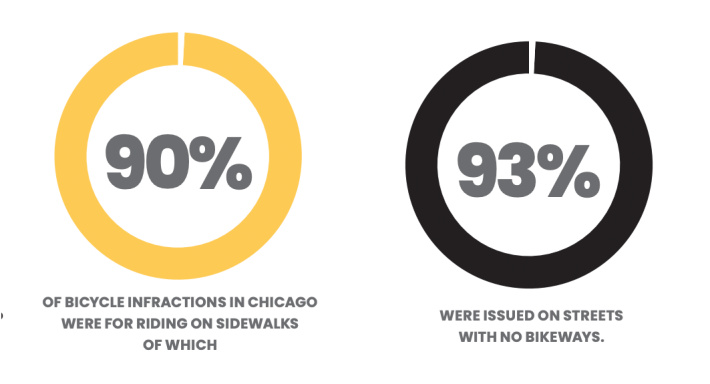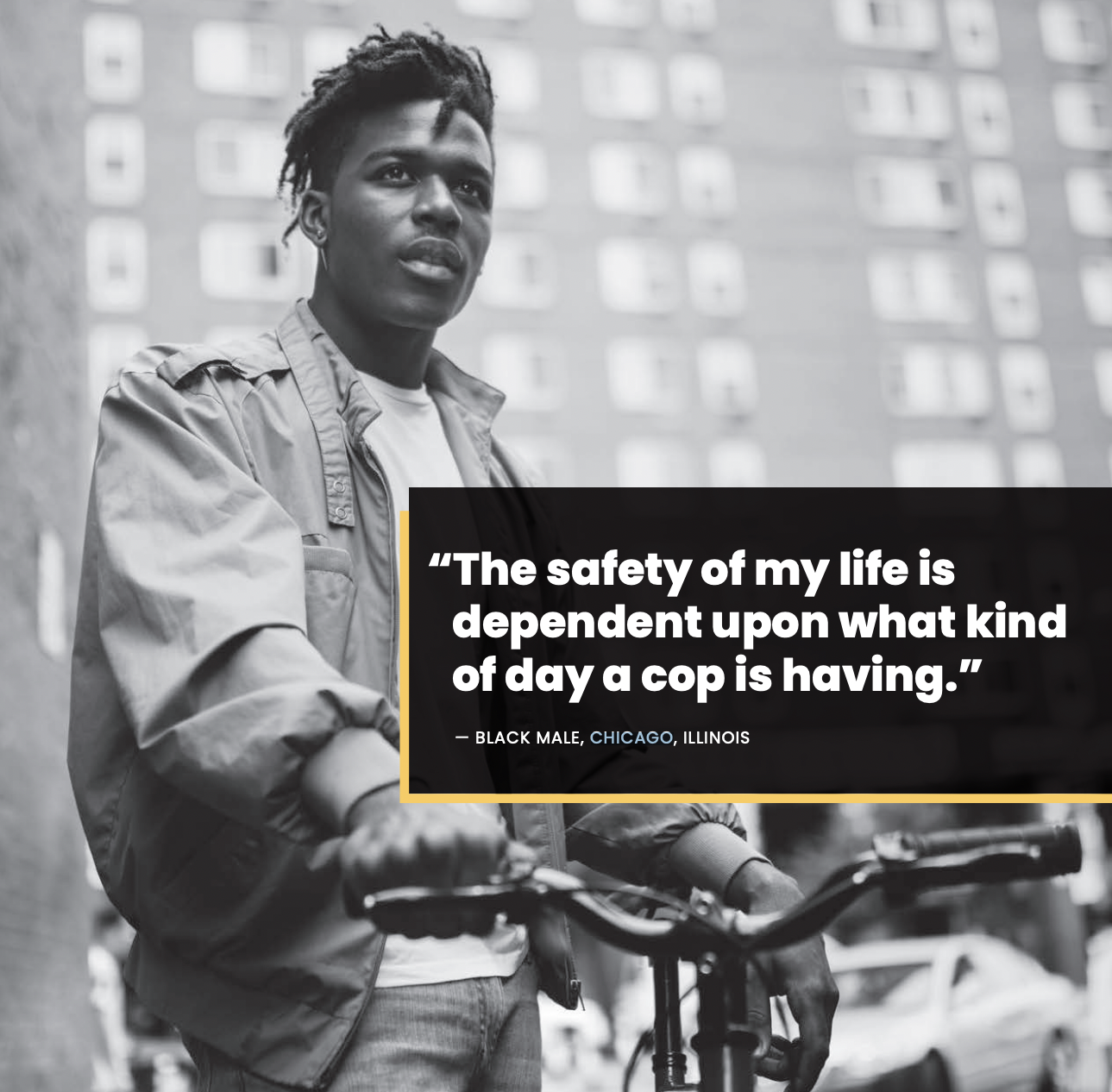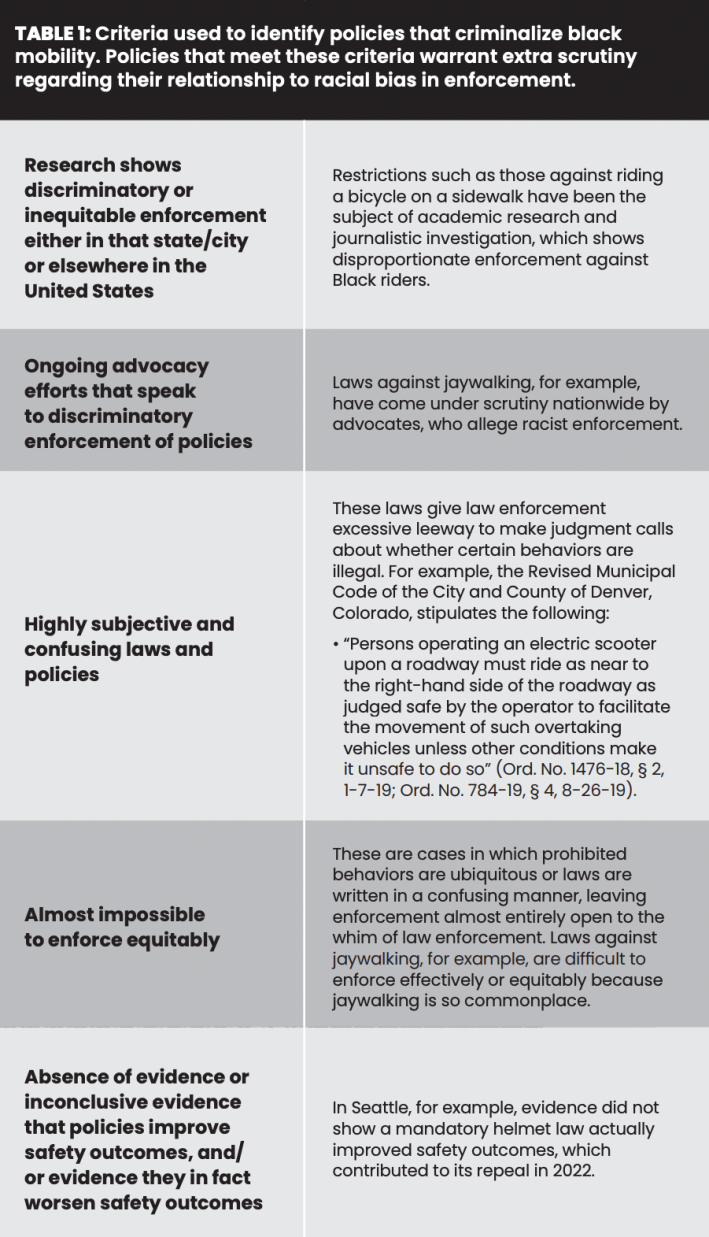A report released today entitled "Arrested Mobility: Barriers to Walking, Biking, and E-Scooter Use in Black Communities in the United States" has a number of ties to Chicago and material about our city. One of the authors is Samuel Kling, a fellow, and director of global cities research at the Chicago Council on Global Affairs. The other two authors of the report are Charles T. Brown, the founder of Equitable Cities and the host of the Arrested Mobility Podcast, and J’Lin Rose, a policy analyst with Equitable Cities.
According to the report, regardless of whether African Americans travel by foot, bicycle, or e-scooter, they face challenges from “inadequate, dangerous infrastructure and poorly targeted or predatory enforcement." In addition, poor infrastructure such as missing sidewalks or a lack of safe bike lanes often forces people in Black communities to break the rules of the road in order to remain safe, but that opens them up traffic stops, "which disproportionately target Black people" and have the potential to escalate to violence. "The safety of my life is dependent upon what kind of day a cop is having," said a Black male from Chicago as quoted in the report.
“An analysis of citations issued by Chicago police and other data such as street infrastructure and neighborhood characteristics showed that 90 percent of all bicycle-related infractions were for cycling on the sidewalk," the report states. "Chicago police wrote eight times as many tickets for cycling on the sidewalk in majority-Black neighborhoods as in majority-white areas, and three times as many in Latino areas. The Chicago study also determined that these tickets were only 'weakly associated with safety needs, if at all,' raising questions about the value and purpose of the stops.”

The Arrested Mobility report includes a table of "Criteria used to identify policies that criminalize black mobility. Policies that meet these criteria warrant extra scrutiny regarding their relationship to racial bias in enforcement." Here are the five main criteria:
- Research shows discriminatory or inequitable enforcement within that state/city or elsewhere in the United States.
- Ongoing advocacy efforts that speak to discriminatory enforcement of policies
- Highly subjective and confusing laws and policies
- Almost impossible to enforce equitably
- Absence of evidence or inconclusive evidence that policies improve safety outcomes, and/or evidence they in face worsen safety outcomes
The Arrested Mobility report identified 15 bicycle laws with at least one of the criteria found in the table, which they grouped into two categories: group riding, and licensing and equipment. A couple of these 15 laws directly pertain to Chicago.
One of these is bans on biking on the sidewalk. "As discussed above, a Chicago study found sidewalk riding prevalent in areas with poor or unsafe bike infrastructure... The Chicago study also found that 93 percent of tickets for bicycle infractions were issued on streets with no bikeways. These areas were disproportionately Black and Latino."
Another Pedestrian Matrix table took the above criteria and and identified the pedestrian mobility policies that met the standards of being discriminatory. These included bans on "crossing at other than crosswalk or crossing outside of crosswalk," aka jaywalking. The authors found such laws in all 50 states, six counties, and 12 cities, one of which is Chicago. Another law was "suddenly leaving curb.” The report authors found that law in 30 states, four counties, and 15 cities, including Chicago.
A Bicycle Matrix table covers bike laws that met the standards of discrimination as defined in the first table. The only one that was identified as existing Chicago is a ban on "emerging from alley or driveway" or “darting into traffic." That law was found in 30 states, four counties, and 14 other cities besides Chicago.
An E-scooter Matrix table mentioned multiple laws applicable to Chicago such as "age limit to determine who can ride," which exists in 15 states and 21 cities. "Riding on the sidewalk" was in 18 states and 43 cities. "Clinging/attaching to vehicles," is in 8 states and 16 cities. Proper parking rules apply in 16 states and 45 cities. "Carrying more than one person," applies to 13 states and 30 cities. And 11 states and 16 cities have laws about how far in front the lamps on the scooters must be visible.
The Arrested Mobility report suggests that cities like Chicago not only need to provide equitable safety infrastructure in communities of color, they also need to rethink traffic laws and enforcement in order to remove barriers to mobility.







